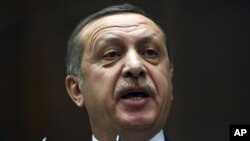Turkey is hardening its stance against the Syrian leadership and its Western allies are increasingly looking to Ankara for efforts to help unseat Syrian President Bashar al-Assad. There is debate in Turkey over whether international sanctions and diplomatic pressure on Syria could lead to military intervention and what role Ankara should play.
In his weekly address to his parliamentary deputies Tuesday, Prime Minister Recep Tayyip Erdogan said the U.N. Security Council's failure last weekend to pass a motion pressuring Syria was a fiasco. He said Turkey is prepared to offer an alternative plan, even if that might trigger another veto by Russia and China, whose "no" votes blocked the original resolution on Saturday
The prime minister said Turkey is helping to prepare a new initiative with Western allies that support opponents of the Syrian regime. Turkey's foreign minister is set to visit Washington this week for high-level talks.
Mr. Erdogan offered no details, but word of a new plan comes as Ankara has positioned itself at the forefront of those condemning Syria, its neighbor and once close ally, for the bloodshed the Damascus regime has inflicted on protesters.
Turkish Foreign Ministry spokesman Selcuk Unal says despite the recent U.N. setback, Ankara is looking to diplomacy to end the Syrian crackdown, even if that means diplomacy outside the U.N. framework.
"To get grounds for other countries - of course, including Arab countries - and other key partners on what can be done because of the non-response of Syria to those unilateral regional and international efforts, should not keep us from looking for other initiatives," said Unal.
Turkey is harboring a number of Syrian opposition leaders, including some from the Free Syrian Army, a militia drawn mainly from defectors from the Syrian armed forces. Some media reports say Ankara is arming the rebels or allowing arms to be supplied to them from Arab countries.
Turkish Foreign Ministry officials deny those charges.
Semih Idiz, diplomatic correspondent for the Turkish newspaper Milliyet, says Ankara does not want to act alone against Damascus.
"Well Turkey, by nature in terms of its foreign policy, and you can underline this, has always been multilateralist," said Idiz. "So in situations like this, Turkey likes to act with the international community."
Washington and London have cited the importance of Ankara, with its 800-kilometer-long border with Syria, in resolving the crisis. Turkey's army is the second largest in NATO and could enforce a buffer zone within Syria.
The opposition Syrian National Council has been calling for intervention with Turkey playing a key role. But Foreign Ministry spokesman Unal said the international community must be in concert with Turkey.
"At the moment there is no sort of [military] project on our agenda," he said.
However, Turkish foreign policy expert Soli Ozel says military intervention is possible if the situation in Syria deteriorates further.
"[If] you end up with civil war, with massive waves of refugees, that is going to generate a lot of problems for you as well, which is when a buffer-zone idea would, I suppose, come closer to materializing than at any other time," said Ozel.
Foreign Minister Ahmet Davutoglu said recently that Turkey's doors are open to Syrian refugees. If need be, he pledged, they will be taken into people's homes. That offer has been interpreted by some Turks as a warning to Damascus: As Mr. Erdogan has said, Turkey will not stand by as Syria implodes.
Turkey Debates Role in Possible Syria Intervention
- By Dorian Jones














